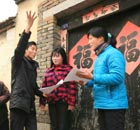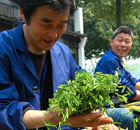Global General
WHO: A/H1N1 pandemic flu yet to peak
(Xinhua)
Updated: 2010-02-24 21:14
 |
Large Medium Small |
GENEVA: The A/H1N1 pandemic influenza has not fully passed its peak yet despite decling transmission of the virus in many parts of the world, the World Health Organization (WHO) said on Wednesday.
Dr Keiji Fukuda, the WHO's special adviser on pandemic influenza, made the announcement following a teleconference of the UN agency's Emergency Committee on Tuesday.
| ||||
Based on the evidence presented in the discussions and the views of the experts, WHO Director-General Margaret Chan decided that "it was appropriate not to make any changes in the current pandemic phases right now, and that she would reconvene the Emergency Committee some time in the next several weeks to review the situation again," Fukuda said.
According to the WHO's definition, a post-peak period means pandemic disease levels in most countries with adequate surveillance will have dropped below peak observed levels, but it does not mean that the pandemic is over.
The post-peak period signifies that pandemic activity appears to be decreasing; however, it is uncertain if additional waves will occur and countries will need to be prepared for a second wave.
Fukuda reiterated that although the A/H1N1 pandemic influenza appeared not as severe as officials originally expected, the situation could change as flu viruses are highly unpredictable.
He said the WHO "is not making any changes in its recommended actions at this time," which means governments should keep their guard against any severe outbreaks and continue their vaccination programs.
The new H1N1 virus was first identified in North America last April, and the WHO raised the pandemic alert phase to the highest of six in June. So far more than 212 countries and overseas territories or communities have reported laboratory confirmed cases of the influenza, including nearly 16,000 deaths.
Recently the pandemic influenza activity has shown an overall declining pattern in the northern hemipshere, but inceases of cases have been reported in some Western African countries.










